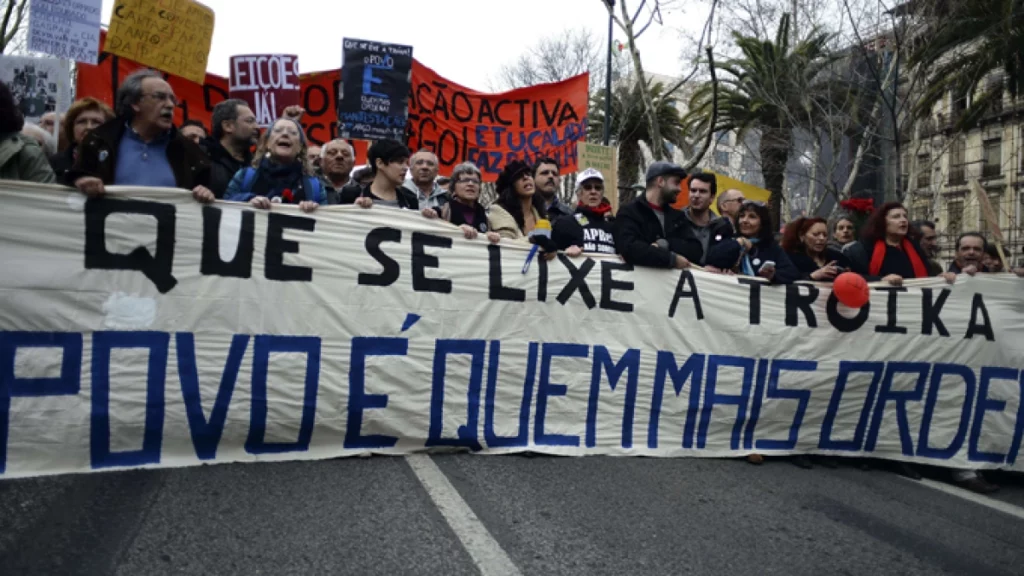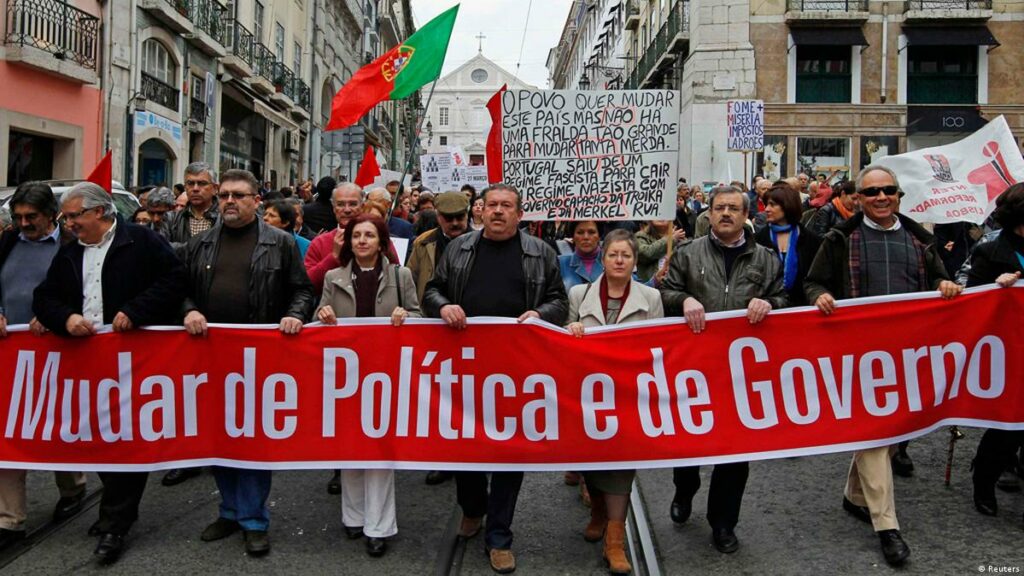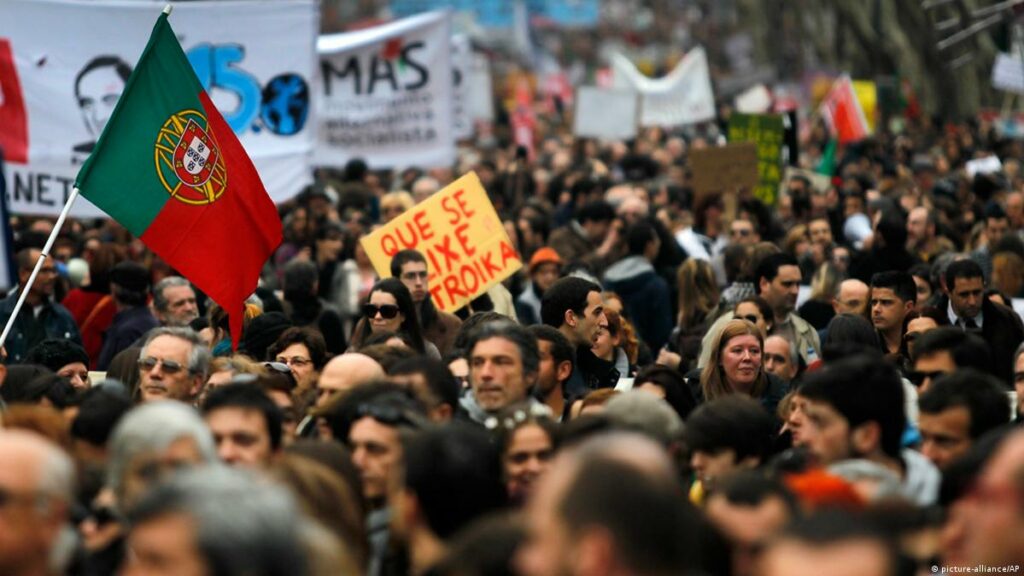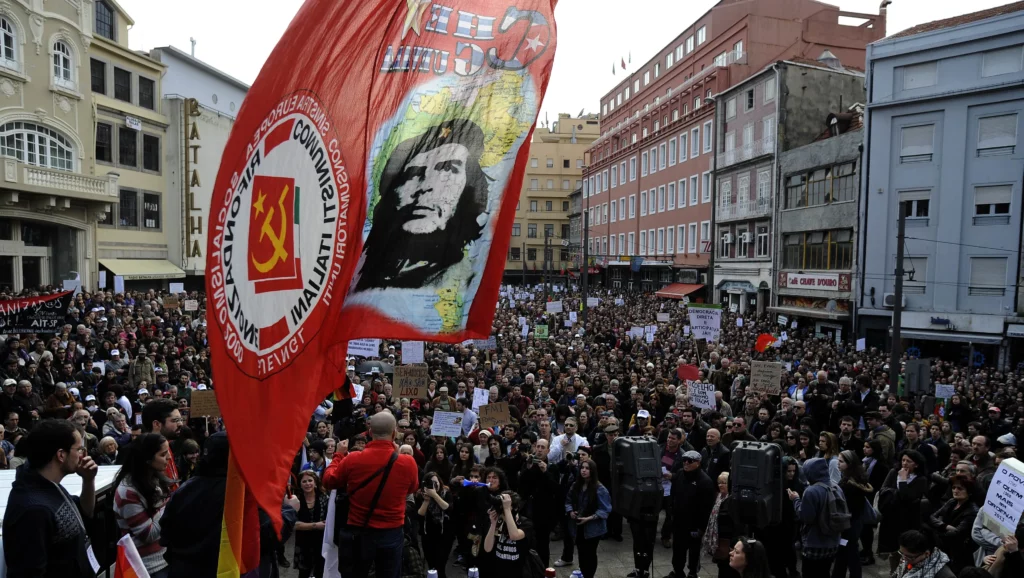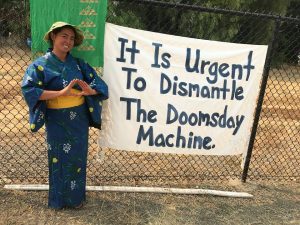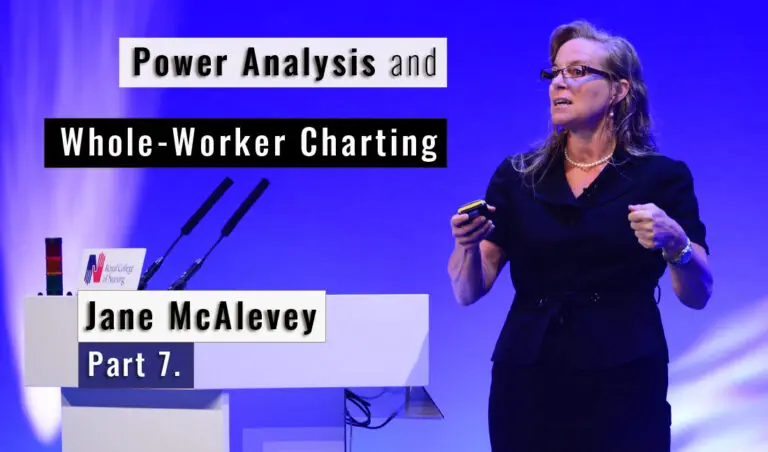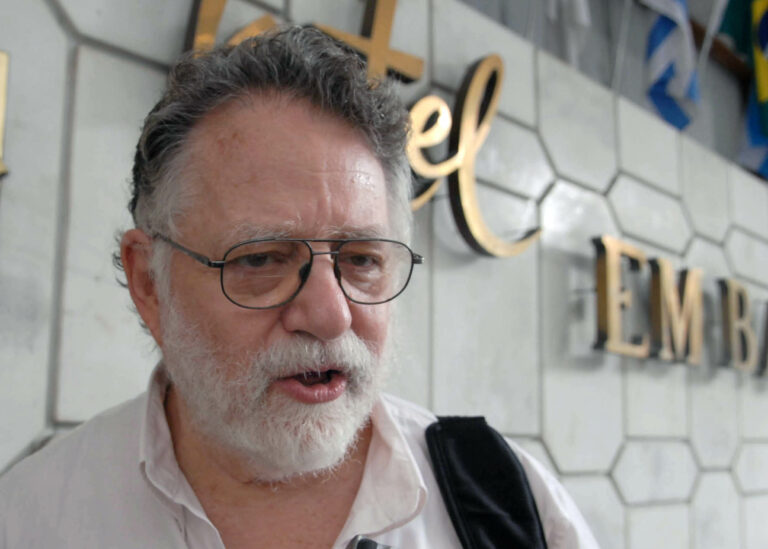This interview was originally published on July 21, 2015. On Reality Asserts Itself, Ms. Principe and Paul Jay talk about making decisions in a new kind of party.
PAUL JAY, SENIOR EDITOR, TRNN: Welcome back to Reality Asserts Itself on The Real News Network. I’m Paul Jay. We’re continuing our series of interviews with Catarina Príncipe. And she joins us now the studio. Thanks for joining us again. Catarina is an organizer with the Left Bloc in Portugal, Die Linke in Germany. She’s written for–continues to–writes for Jacobin magazine. Thanks for joining us again. So we’re just going to pick up the conversation where we left off. Go back and watch the other segments and you’ll know what we’re talking about. So we were talking about the relationship building a mass movement in Portugal and the question of building a party and how in the United States particularly a lot of the left has seen anything electoral winds up either getting vacuum cleaned up by the Democratic Party or so marginalized it seems like a waste of effort, with the exception of a few breakthroughs in some cities. The Green Party’s certainly making a big effort here, and there are some others, but I think it seems like the Green Party is the most organized nationally as a progressive third party. But you were talking about the experience of movement and party in Portugal and you were about to make another point.
CATARINA PRÍNCIPE, SOCIAL ACTIVIST: Yeah. I was about to say that there’s also something that I think is important about parties. They tend to–because parties have political programs that are not applicable just, like, right now, they’re not–they have several–they deal with several topics, they’re not one-issue organizations like movements tend to be, so not only do they connect and interlink, a lot of different people and activists that–they are intergenerational and so on and so forth; they tend to last–that’s also the intention–they tend to last longer than movements. Even in times of defeat, even in times of lower struggle, they’re still there. So they carry on a certain political-historical memory, political education. You know. And this is a very important thing, because the parties are also structures that keep on discussing, preparing people, talking to people, trying to win people, trying to dispute society in small steps. And so they are like places that don’t disappear so easily as movements, because they have a middle- or a long-term strategy to change society. And yeah. And they keep–they prevent, I think, the feeling of indignation to disappear, you know, completely from society.
JAY: Resignation.
PRÍNCIPE: Resignation or indignation.
JAY: Oh, both; oh, I guess both.
PRÍNCIPE: Both.
JAY: Yeah. Yeah, both. Yeah.
PRÍNCIPE: Yes.
JAY: Yeah.
PRÍNCIPE: So they prevent this. They’re still–even if they’re small bubbles, you know, the fact that they exist and that people are part of these structures–.
JAY: And you can see that in SYRIZA in Greece.
PRÍNCIPE: Of course.
JAY: At times when the movement was very low, and even when SYRIZA was very small, the next time the movement was big, SYRIZA had a breakthrough.
PRÍNCIPE: Exactly.
JAY: Yeah. But in the earlier segment you talked about but these are parties of a new type. Now, the last person that said that in those words was probably Lenin, and his party of a new type was very centralized, and to some extent for understandable reasons. They were working in an illegal situation. They were really working in a police state. And perhaps in those kinds of conditions it’s hard to have this big, open Democratic forum that we’re seeing in Europe and some other places. But what is it–how do decisions get made in this party of a new type?
PRÍNCIPE: I think we need centrality, at least a certain kind of centrality.
JAY: Well, ’cause you said earlier, like, one of the reasons you didn’t make demands in the movement: because people could never agree on the demands; you’re just critiquing. You’ve got a party, you’ve got to have demands and a program and make decisions.
PRÍNCIPE: Exactly. Well, how do we make decisions? This is your question. So in Bloco particularly we have–the way the party is structured is the local organizations of the party elect delegates that–and the delegates are elected according to a certain political motion or a certain political standard that is collectively built, and they’re just normally different from, like, the party convention.
JAY: Explain that.
PRÍNCIPE: Okay. It’s complicated like this. So when we have a congress, a national congress, right, so all the party comes together to decide on the next year, next two years, what is going to be our political stand on everything and what is going to be our strategy to dispute politics for the next two years, how Bloco was organized–and different parties in Europe are organized differently. Like, Die Linke, for example, in Germany is organized differently. But how in Bloco we organize is the local structures of Bloco–so people organize inside the party according to a certain orientation, strategic orientation. We call that a motion. So it’s like, yeah, a document where we lay out a strategy and the political analysis of the current political situation, what do we want to achieve, and so on and so forth. And people are elected as delegates according to their political stance, so according to which motion they belong to.
JAY: So there’s more than one strategy.
PRÍNCIPE: Yeah. Yeah.
JAY: And people are I support this strategy, you get elected, now you represent that strategy.
PRÍNCIPE: That strategy. Exactly. And then these people are elected on a local basis, and they go as delegates to the party congress. And then there is a discussion. People are not forced to vote. The delegates have individual mandates. So they tend tendentially vote for the strategy that they stand for.
JAY: And what’s an example of a couple of differing strategies? Like, what would make them any different from each other?
PRÍNCIPE: There hasn’t–like, there are some–there hasn’t been so many different, like, very, very different strategies, but there are some issues that have been of high discussion in Bloco. One of them is, for example, our relation to the Socialist Party. Should we go into coalition governments with them, for example, at the local level? At the national level I think this question was always more or less excluded. But should we go into coalitions with them at the local level or not? What should we build around? Which kind of campaign should we build? Should we build around, for example, our last congress that was–.
JAY: Let’s take that one.
PRÍNCIPE: Okay.
JAY: Alright. So somebody says, I’m for the strategy of a local alliance with the Socialist Party, and someone over here says, I’m not and here’s our strategy. Both can be elected–
PRÍNCIPE: Yes.
JAY: –because the people that agree with this will elect their representative for that, and same for this. At some point there has to actually be a decision.
PRÍNCIPE: Yes, there’s a majority decision.
JAY: At–.
PRÍNCIPE: At the party convention.
JAY: At the party convention.
PRÍNCIPE: Or the party congress.
JAY: Where everybody votes?
PRÍNCIPE: Where all the delegates vote.
JAY: All the delegates vote.
PRÍNCIPE: Yes.
JAY: And they will say, okay, so the representatives for this strategy will make their case, and these will make their case, and then there’s a vote. And then–.
PRÍNCIPE: And in the end there is a vote. And then there’s–exactly.
JAY: And what happened on that vote? What was the decision?
PRÍNCIPE: It’s complicated to say, because it was not–neither of the motions were built–this was just part of the discussion, and neither of the motions were built, like, with this centrality. But we tendentially do not do, do not ally with the Socialist Party unless there are situations of exception. There are some situations of exception where we have decided that it would make sense, but as a rule we don’t go into any kind of coalition governments with the Social Democratic Party.
JAY: I mean, it’s very interesting, ’cause you’re making room at the national convention for a diversity of opinion.
PRÍNCIPE: Mhm.
JAY: But even who gets to represent a certain motion, say, there has to be some criteria, ’cause you could have 100 of them. You know, you could–every single–you could have some person who just wants to have a fight and argument. And, I mean, how do you establish which of the motions worthy of voting for? Is there a certain–they have to get a certain number of votes? Is there a bar there?
PRÍNCIPE: No. The motions are presented before the congress.
JAY: Yeah, I’m saying that. Yeah.
PRÍNCIPE: Okay. So the delegates that go to the Congress, they go according like they are representatives of a certain motion. But any motion can show up. The only thing you need is the support of 15 members of the party.
JAY: That’s what I’m getting at. You need 15 people and the motion goes. That’s what I’m getting at.
PRÍNCIPE: Yes.
JAY: Okay. Alright. Then there’s some kind of–is there some executive committee elected at this national congress?
PRÍNCIPE: Yes, and the national congress elects the national leadership and decides by–which is proportional. So each motion has related to it a slate of people that are running for the national leadership. The national leadership is composed proportionally. So if one motion gets, let’s say, 60 percent, it elections 60 percent of the national leadership; and another motion gets 20, it elects 20 percent of the places. So it’s proportional. And the strategy paper that is voted by majority is the one that is applied for the next two years.
JAY: But the voices of the other strategies are on the national committee, so even if they lose the–.
PRÍNCIPE: They still have–.
JAY: They’re still there to have a say.
PRÍNCIPE: Yes.
JAY: Very interesting. How does it work in Germany? Now, this is called Die Linke, which is The Left, which you also work with.
PRÍNCIPE: There’s–in Die Linke there’s individual voting. So we have slate voting. So we have slate voting that is connected to a motion of orientation. In Die Linke, there are no motions of orientation in the same way. Like, people come to the congress and they discuss on several issues, and people present themselves for the leadership individually. They say what, more or less, they stand for. But it’s a less–I would say it’s a less collective and organized way of structuring the party. JAY: And are you familiar with Podemos? How do they do it?
PRÍNCIPE: Oh. I don’t know. I don’t know exactly how they–I think they only had one big convention yet, because they just formed as a party. So I’m not familiar exactly how did they–how the process was.
JAY: And in Portugal, I mean, many of many of the movements have their own kind of leadership structures, I assume. How do the movements relate to Left Bloc? Or is it interchangeable that people that are activists in the movement are mostly also activists and Left Bloc?
PRÍNCIPE: A lot of people that are activists in the movement are members of the Left Bloc, but many are also not. Some of the people that are activists in the social movement are members of the Communist Party. Many are also not. Right? So the relation between Bloco and the movements is a bit–it has been–how do you say this? Did she deteriorated in the last years?
JAY: Why?
PRÍNCIPE: I think because we took kind of a–like, a little bit of an institutional turn after 2009 and in 2011 when we lost half of the votes.
JAY: Going from 10 percent to 5 percent.
PRÍNCIPE: To 5 percent. There was a very big internal crisis that still goes on. And one of the points of disagreement is precisely how exactly do we engage with the movements, how do we see them, what movements do we build, what is our role, and so on. And this is also a point of disagreement that has been discussed in the party. I think the electoral turn that we took or the more institutional turn that we took has–so–.
JAY: Like what?
PRÍNCIPE: I want to try to explain this by explaining, like, the two underlying strategies of the Left Bloc, which I think is more or less basically the strategies for all broad left parties. So on the one hand, we want to undermine the traditional social democratic parties that are fully liberalized and so on by winning their social basis of support. For this, we need to look like or to be like, to act like a party like the others, you know, like a more serious party that is not oppositional.
JAY: Well, it has to be a party capable of governing.
PRÍNCIPE: Exactly, a party capable of governing that behaves in a certain way, that shows itself in a certain way, and that–yeah, and that has this, like, feeling of responsibility and so on, so that these people would trust us, so to say. At the same time, there’s 40 percent of people in Portugal that don’t vote, and we want to engage with those people. And as it has happened all over Europe, one of the big critiques has been to this political system as it is, that this kind of political system does not represent us, it’s not Democratic, and so on and so forth. So people are very angry with this kind of, like, dual party system that doesn’t really represent us and that voting is not enough and so on and so forth. So a lot of people have stopped voting or vote for left parties as an opposition or as a form of discontent. So we have to tried these two strategies, to being a kind of a new party, a party that is not a party like the others–and I don’t think we are a party like the others at all, but still, to convince these people that it’s worth engaging with us, it’s worth voting for us, it’s worth organizing with us. And at the same time, because we want to undermine the basis of the traditional social democracy, we need to look a little bit more like a party of the others–like the others. So for the people who don’t like this political system as it is right now, we are too much a party like the others. And for the people who still agree or still are in or are not so critical about this political system, we are too few a party like the others, because we’re too radical or so on. So we pointed in two directions, and we lost both. This is my explanation for what happened. So for the movements what happened is we became a little bit too much a party like the others, but not enough in order to break social democracy.
JAY: So what do you advocate?
PRÍNCIPE: I advocate movement orientation. Yeah, always did, and now more than ever. I think especially moments of crisis, left-wing parties have a very important role to play in being an instrument of concrete daily social intervention.
JAY: So I know you know the Greek situation. SYRIZA had to face the same issues. You know, how do you look like you’re ready to govern, at the same time not lose your connection to the movements and people in the streets. How did they deal with it?
PRÍNCIPE: I think the way they dealt with it was, well, so I think there is the external conditions that we’ve talked a little bit about, so the question of the failure of social democracy that’s important. I think there’s another thing that differentiates Portugal from Greece very much. We’re the two countries are under the Troika, but there is a very big difference, which is the speed of the application of the memorandums, of the programs, of the austerity programs. Like, the elites did learn something from Greece. They learned that if they push too far, there will be a counter-reaction, a stronger counter-reaction. So the way in which austerity is applied in Portugal is very different than the way austerity is applied in Greece. We will get there. You know, in the end it will be the same. But the way it is, it’s much slower, sometimes they give in a little bit, sometimes they take back, they say it was too much, then they give a little bit here, then they raise, like, a little bit the wages for public sector workers, but then they raise the taxes so much that actually the wages–. So, you know, it’s a different way of applying austerity than what happened in Greece. So these two things, so the failure of social democracy and the speed of the application of austerity, have created subjective conditions for the growth of the left. Also, I think the social movements in Greece are more structured for many years. They had very big social movement–student movements in 2007 against the privatization of higher education. They had, 2008, the big, big anti-police violence movements when the police killed Alexis Grigoropoulos, a 15-year-old boy, in the squares, and there was a very, very big movement where SYRIZA, as a party, it was the only party that supported this movement, and their activists were there every day. And they–after this, they were, like, 2, 3, 4 percent in the polls, right, because most society thought these people are crazy or they’re supporting supporting the riots. But they did it. And then, in 2011, when there were the occupations of the squares and this new wave of solidarity structures happening around the country and so on, SYRIZA was not only there–you know, you don’t need to bring your flag for people to know who you are, but people were there and were there in an equal level to all the other activists. And so I think this is a very–like, the way that SYRIZA dealt with the moments and the movements that were happening in the country was the correct one. It was not to reclaim the movements to themselves, to give them the independence that they need and should have, but at the same time to participate actively in them, and to make the link to say, okay, we’ve been occupying the streets for weeks. We had 36 general strikes. There’s several, like, sectoral strikes, occupation of universities. They’re going on for two or three years now. Nothing has changed. How do we change it? We need to take state power. We need to be government. And basically this is what happened. It’s, like, people were protesting. And when there was–like, the last year before, so 2014, there were very few protests in Greece, actually. People were demoralized. They were hopeless. They were tired of protesting, of organizing and nothing was happening. And the only solution they saw was, okay, nothing will change if we don’t take power. We need to take power. And for this we need a political party. And, of course, SYRIZA was there. So I think this is what explains, so to say, the dynamics of what happens in Greece, and why we need political parties, also.
JAY: One more segment. We didn’t get to talk about what’s going on in Germany, and Catarina’s living there. So in the next segment, we’re going to talk about what is the response of the German left, the German workers to what’s happening in Greece, in Portugal, in Spain, and to themselves. So please join us on Reality Asserts Itself on The Real News Network.
Never miss another story
Subscribe to theAnalysis.news – Newsletter
“Catarina Príncipe is a social movement activist from Portugal and a Jacobin contributing editor.”

